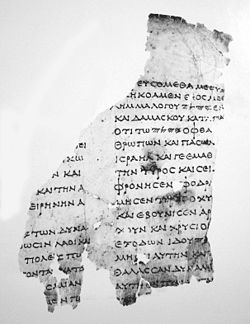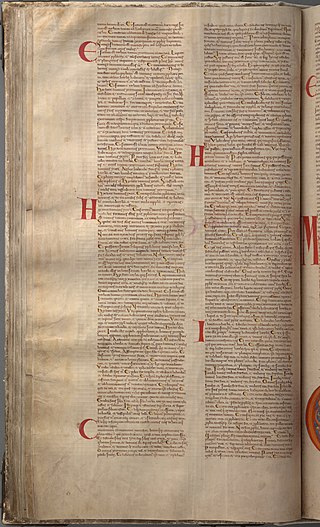
Zechariah 12 is the twelfth of the total 14 chapters in the Book of Zechariah in the Hebrew Bible and the Old Testament of the Christian Bible. This book contains the prophecies attributed to the prophet Zechariah, and is a part of the Book of the Twelve Minor Prophets. This chapter is a part of a section consisting of Zechariah 9–14. This chapter and chapter 13 verses 1–6 are a section, forming a three-section "entity" with 13:7–9 and 14:1-21.
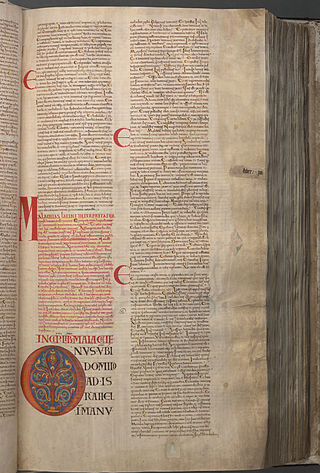
Zechariah 14 is the fourteenth chapter in the Book of Zechariah in the Hebrew Bible and the Old Testament of the Christian Bible. This book contains the prophecies attributed to the prophet Zechariah, and is a part of the Book of the Twelve Minor Prophets. This chapter is a part of a section consisting of Zechariah 9–14. It continues the theme of chapters 12–13 about the 'war preceding peace for Jerusalem in the eschatological future.' It is written almost entirely in third-person prophetic discourse, with seven times references to the phrase 'that day'.

Zechariah 3 is the third of the total 14 chapters in the Book of Zechariah in the Hebrew Bible or the Old Testament of the Christian Bible. This book contains the prophecies attributed to the prophet Zechariah, and is a part of the Book of the Twelve Minor Prophets. The chapter contains the vision of Joshua, the high priest, being cleansed before God. It is a part of a section consisting of Zechariah 1–8.
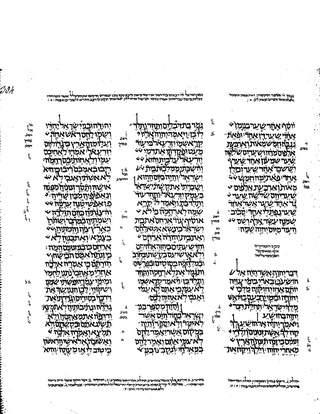
Zechariah 2 is the second of the total 14 chapters in the Book of Zechariah in the Hebrew Bible or the Old Testament of the Christian Bible. This book contains the prophecies attributed to the prophet Zechariah, and is a part of the Book of the Twelve Minor Prophets. This chapter is a part of a section consisting of Zechariah 1–8. It records the third of eight visions received by the prophet, followed by an oracle calling the exiles to return to the city where Yahweh is about to dwell and all nations will come.

Zechariah 1 is the first chapter of the Book of Zechariah in the Hebrew Bible or the Old Testament of the Christian Bible. This book contains the prophecies attributed to the prophet Zechariah, and is a part of the Book of the Twelve Minor Prophets. As the first of the total 14 chapters in the book, this chapter is a part of a section consisting of Zechariah 1-8. It records an introduction and the first two of eight visions received by the prophet.

Zechariah 6 is the sixth of the total 14 chapters in the Book of Zechariah in the Hebrew Bible or the Old Testament of the Christian Bible. This book contains the prophecies attributed to the prophet Zechariah, and is a part of the Book of the Twelve Minor Prophets. This chapter contains the description of the eighth vision and the crowning of Joshua. It is a part of a section consisting of Zechariah 1–8.

Zechariah 7 is the seventh of the total 14 chapters in the Book of Zechariah in the Hebrew Bible or the Old Testament of the Christian Bible. This book contains the prophecies attributed to the prophet Zechariah, and is a part of the Book of the Twelve Minor Prophets. This chapter is a part of a section consisting of Zechariah 1–8. The Jews having sent to inquire concerning the set fasts, Zechariah 7:1-3, Zechariah reproves the hypocrisy of their fasts, Zechariah 7:4-7, and they are exhorted by repentance to remove the cause of their calamity, Zechariah 7:8-14.
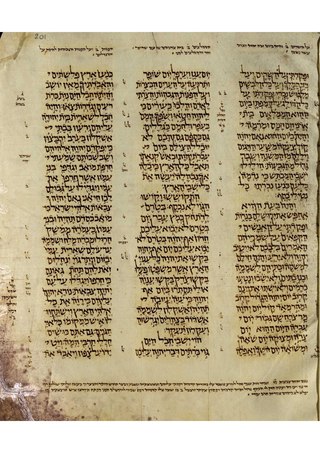
Zechariah 9 is the ninth of the total 14 chapters in the Book of Zechariah in the Hebrew Bible or the Old Testament of the Christian Bible. This book contains the prophecies attributed to the prophet Zechariah, and is a part of the Book of the Twelve Minor Prophets. This chapter is a part of a section consisting of Zechariah 9–14. It concerns about the advance of an enemy, but God defends Jerusalem and his king will triumphantly enter the city to bring peace among all nations. This chapter also contains a continuation of the subject in the seventh chapter. The part about the king's entry into Jerusalem is quoted in the New Testament, especially in the event of Jesus' triumphal entry into Jerusalem.

Zechariah 10 is the tenth of the total 14 chapters in the Book of Zechariah in the Hebrew Bible or the Old Testament of the Christian Bible. This book contains the prophecies attributed to the prophet Zechariah, and is a part of the Book of the Twelve Minor Prophets. This chapter is a part of a section consisting of Zechariah 9–14.

Zechariah 11 is the eleventh of the total 14 chapters in the Book of Zechariah in the Hebrew Bible or the Old Testament of the Christian Bible. This book contains the prophecies attributed to the prophet Zechariah, and is a part of the Book of the Twelve Minor Prophets. This chapter is a part of a section consisting of Zechariah 9–14.

Zechariah 13 is the thirteenth of the total 14 chapters in the Book of Zechariah in the Hebrew Bible or the Old Testament of the Christian Bible. This book contains the prophecies attributed to the prophet Zechariah, and is a part of the Book of the Twelve Minor Prophets. This chapter is a part of a section consisting of Zechariah 9–14. Verses 1–6 may be a part of a section together with 12:1-14, whereas verses 7–9 is a separate part, forming a three-section "entity" with 14:1-21.

Jeremiah 29 is the twenty-ninth chapter of the Book of Jeremiah in the Hebrew Bible or the Old Testament of the Christian Bible. It is numbered as Jeremiah 36 in the Septuagint. This book compiles prophecies attributed to the prophet Jeremiah, and is one of the Books of the Prophets. This chapter records several "letters reported by the third-person narrator": from Jerusalem, Jeremiah sent a letter to the people in the Babylonia exile and he responded to a letter about him from Shemaiah.

Ezekiel 2 is the second chapter of the Book of Ezekiel in the Hebrew Bible or the Old Testament of the Christian Bible. This book contains the prophecies attributed to the prophet/priest Ezekiel and is one of the Book of the Prophets. In this chapter, set within a wider section from Ezekiel 1:28b to Ezekiel 3:15, "Ezekiel receives a commission [from God] to go to the 'rebellious house' of Israel" and to speak for God.

Ezekiel 24 is the twenty-fourth chapter of the Book of Ezekiel in the Hebrew Bible or the Old Testament of the Christian Bible. This book is attributed to the prophet/priest Ezekiel, and is one of the Books of the Prophets. This chapter contains Ezekiel's "last oracle against Jerusalem".

Jeremiah 11 is the eleventh chapter of the Book of Jeremiah in the Hebrew Bible or the Old Testament of the Christian Bible. This book contains prophecies attributed to the prophet Jeremiah, and is one of the Books of the Prophets. This chapter includes the first of the passages known as the "Confessions of Jeremiah".

Jeremiah 19 is the nineteenth chapter of the Book of Jeremiah in the Hebrew Bible or the Old Testament of the Christian Bible. This book contains prophecies attributed the prophet Jeremiah, and is one of the Books of the Prophets.

Jeremiah 33 is the thirty-third chapter of the Book of Jeremiah in the Hebrew Bible or the Old Testament of the Christian Bible. It is numbered as Jeremiah 40 in the Septuagint. This book contains prophecies attributed to the prophet Jeremiah, and is one of the Books of the Prophets.

Jeremiah 32 is the thirty-second chapter of the Book of Jeremiah in the Hebrew Bible or the Old Testament of the Christian Bible. It is numbered as Jeremiah 39 in the Septuagint. This book contains prophecies attributed to the prophet Jeremiah, and is one of the Books of the Prophets. In this chapter, Jeremiah redeems a piece of property belonging to his family and explains the significance of his act.

Jeremiah 25 is the twenty-fifth chapter of the Book of Jeremiah in the Hebrew Bible or the Old Testament of the Christian Bible. This book contains prophecies attributed to the prophet Jeremiah, and is one of the Books of the Prophets. Chapter 25 is the final chapter in the first section of the Book of Jeremiah, which deals with the earliest and main core of Jeremiah's message. In this chapter, Jeremiah identified the length of the time of exile as seventy years.

Jeremiah 31 is the thirty-first chapter of the Book of Jeremiah in the Hebrew Bible or the Old Testament of the Christian Bible. It is numbered as Jeremiah 38 in the Septuagint. The book contains prophecies attributed to the prophet Jeremiah, and is one of the Books of the Prophets (Nevi'im). This chapter is notable for the passage about the "New Covenant" (31:31-34) of God with His restored people and the quoting of 31:15 in the “Massacre of the Innocents" narrative. The Jerusalem Bible refers to chapters 30 and 31 as "the Book of Consolation", and Lutheran theologian Ernst Hengstenberg calls these two chapters "the triumphal hymn of Israel’s salvation".
